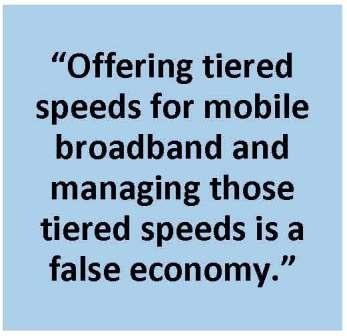
VANCOUVER – Telus had a busy Friday.
On the financial front, the company released strong fourth quarter and full-year 2011 results across both its wireless and wireline networks. On the network technology side, the company turned on its LTE network in 14 markets from coast-to-coast.
Given the new, much-faster data capabilities of LTE (theoretically up to 75 Mbps download, but more practically somewhere in the 12-25 range), why isn’t Telus charging premium prices for the new devices and perhaps for different speeds of service, Canaccord Genuity analyst Dvai Ghose asked Telus executives during the company’s quarterly conference call.
While that may sound good for Telus’ financial metrics in theory, in practice it doesn’t make sense for the company, said EVP and chief commercial officer Joe Natale.
“In our view, offering tiered speeds for mobile broadband and managing those tiered speeds is a false economy. You may, for a period of time, be able to charge a premium, but when you look at a number of factors, you quickly decide that it really isn’t clear and simple,” said Natale.
“Tiered speeds will give rate complexity, will give billing complexity, will create customer care complexity. There is a variation in the actual (wireless download) speed that’s connected to a number of factors… whether it’s proximity to a tower, whether it’s congestion on the radio access network… the type of backhaul connected to that tower – so you get into a place where there is a variability around a band – and at $10-$12 a phone call, we’re going to spend far too many phone calls explaining to customers where they sit on that particular band and where they may have gone from LTE coverage to HSPA coverage as a result and therefore their bill will become even more complex.”

Basically, providing tiered models for LTE would be confusing and potentially quite frustrating for the customer as well as difficult for the company to deploy and monitor, especially since LTE is not ubiquitous across Telus’ wireless footprint.
“So we looked at it and said, ‘you know, this business has grown up as a pay-per-use model… faster speeds will actually encourage greater use because of the ability to download music and download videos more effectively and more quickly – and why not have data rate plans that flex automatically based on that conception… and don’t tax the organization with respect to complexity nor drive frustration for customers’,” Natale continued.
“If there’s one huge source of frustration for mobile customers, it has been around simplicity and clarity and data rates and data billing. I mean, we all have horror stories around overage and shock in the bill… so our view is that we will get the growth based on adoption and based on faster and easier use of higher speeds.”
Ed note: Rogers Wireless informed us after this story was originally published that it, too, does not demand a premium charge for LTE, for the same reasons.
– Greg O’Brien


